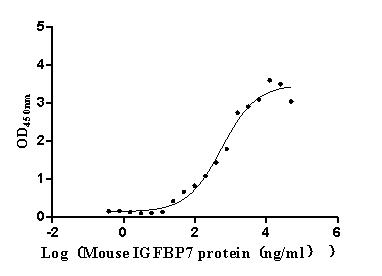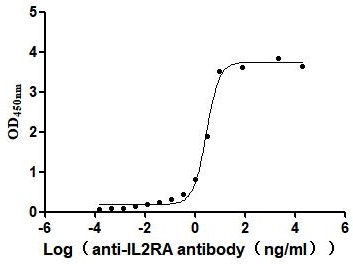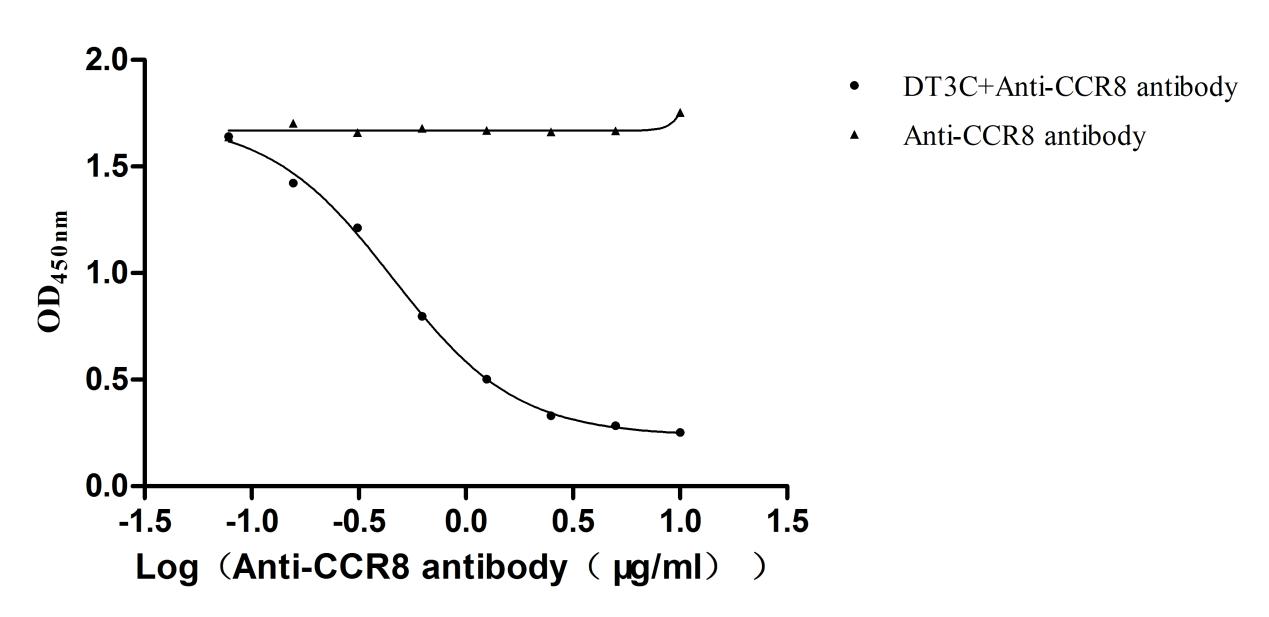Recombinant Mouse Phosphatidylethanolamine N-methyltransferase (Pemt), partial
-
货号:CSB-YP017780MO1
-
规格:
-
来源:Yeast
-
其他:
-
货号:CSB-EP017780MO1
-
规格:
-
来源:E.coli
-
其他:
-
货号:CSB-EP017780MO1-B
-
规格:
-
来源:E.coli
-
共轭:Avi-tag Biotinylated
E. coli biotin ligase (BirA) is highly specific in covalently attaching biotin to the 15 amino acid AviTag peptide. This recombinant protein was biotinylated in vivo by AviTag-BirA technology, which method is BriA catalyzes amide linkage between the biotin and the specific lysine of the AviTag.
-
其他:
-
货号:CSB-BP017780MO1
-
规格:
-
来源:Baculovirus
-
其他:
-
货号:CSB-MP017780MO1
-
规格:
-
来源:Mammalian cell
-
其他:
产品详情
-
纯度:>85% (SDS-PAGE)
-
基因名:Pemt
-
Uniprot No.:
-
别名:Pemt; Pempt; Pemt2; Phosphatidylethanolamine N-methyltransferase; PEAMT; PEMT; Phospholipid methyltransferase; PLMT
-
种属:Mus musculus (Mouse)
-
蛋白长度:Partial
-
蛋白标签:Tag type will be determined during the manufacturing process.
The tag type will be determined during production process. If you have specified tag type, please tell us and we will develop the specified tag preferentially. -
产品提供形式:Lyophilized powder
Note: We will preferentially ship the format that we have in stock, however, if you have any special requirement for the format, please remark your requirement when placing the order, we will prepare according to your demand. -
复溶:We recommend that this vial be briefly centrifuged prior to opening to bring the contents to the bottom. Please reconstitute protein in deionized sterile water to a concentration of 0.1-1.0 mg/mL.We recommend to add 5-50% of glycerol (final concentration) and aliquot for long-term storage at -20℃/-80℃. Our default final concentration of glycerol is 50%. Customers could use it as reference.
-
储存条件:Store at -20°C/-80°C upon receipt, aliquoting is necessary for mutiple use. Avoid repeated freeze-thaw cycles.
-
保质期:The shelf life is related to many factors, storage state, buffer ingredients, storage temperature and the stability of the protein itself.
Generally, the shelf life of liquid form is 6 months at -20°C/-80°C. The shelf life of lyophilized form is 12 months at -20°C/-80°C. -
货期:Delivery time may differ from different purchasing way or location, please kindly consult your local distributors for specific delivery time.Note: All of our proteins are default shipped with normal blue ice packs, if you request to ship with dry ice, please communicate with us in advance and extra fees will be charged.
-
注意事项:Repeated freezing and thawing is not recommended. Store working aliquots at 4°C for up to one week.
-
Datasheet :Please contact us to get it.
相关产品
靶点详情
-
功能:Catalyzes the three sequential steps of the methylation pathway of phosphatidylcholine biosynthesis, the SAM-dependent methylation of phosphatidylethanolamine (PE) to phosphatidylmonomethylethanolamine (PMME), PMME to phosphatidyldimethylethanolamine (PDME), and PDME to phosphatidylcholine (PC).
-
基因功能参考文献:
- fenofibrate partially reversed hepatic steatosis and fibrosis in Pemt(-/-) mice when treatment was initiated after nonalcoholic fatty liver disease (NAFLD) had already been established. Increasing hepatic fatty acid oxidation can compensate for the lower VLDL-triacylglycerol secretion rate and prevent/reverse fatty liver disease in mice lacking PEMT. PMID: 28159867
- Results show that hepatic PEMT protein levels and activity are post-translationally repressed in homocystinuria and correlates with decreased phosphatidylcholine. PMID: 28291718
- Activation of PPARgamma using pioglitazone in high fat diet-fed Pemt(-/-) mice improved liver function, while these mice were still protected against diet-induced obesity and insulin resistance. PMID: 26797396
- Results showed that Pemt deficiency and high-fat diet in mouse model demonstrated the phenotypes resemble to the clinical features of the patients with lean non-alcoholic steatohepatitis. PMID: 26883167
- propose that cold-induced hypothermia in HF-fed Pemt(-/-) mice is linked to plasma hypoglycemia due to compromised hepatic glucose production. PMID: 26113536
- Lack of PEMT in mice does not promote fatty acid oxidation in skeletal muscle. PMID: 26603903
- Decreased lipogenesis in white adipose tissue may contribute to the resistance to diet-induced obesity in Pemt(-/-) mice. PMID: 25463480
- these findings indicate that the inhibition of Pemt activity ameliorates the ER stress associated with diabetic nephropathy in a model of type 1 diabetes PMID: 24667182
- This study evaluated the role of the role of phosphatidylethanolamine N-methyltransferase in hepatic carbohydrate metabolism in chow-fed mice. PMID: 24677714
- Pemt deficiency results in attenuated secretion of very low-density lipoproteins and homocysteine as well as in increased susceptibility to nonalcoholic liver disease. PMID: 22877991
- Lack of phosphatidylethanolamine N-methyltransferase decreased liver damage in Abcb4(-/-) mice caused by exposure of the liver to excess bile acids. PMID: 21292027
- Treatment strategies aimed at inhibition of PEMT might prevent the accumulation of cardiac triacylglycerol that predisposes individuals to compromised cardiac function. PMID: 21273556
- de novo synthesis of choline via PEMT has a previously unappreciated role in regulating whole body energy metabolism. PMID: 20452975
- During differentiation of 3T3-L1 cells to adipocytes, the amount of Sp1 protein decreased by approximately 50% just prior to activation of PEMT. PMID: 20150657
- Dietary docosahexaenoic acid supplementation modulates hippocampal development in the Pemt-/- mouse. PMID: 19889625
- PEMT is required in the secretion of apoB100-containing VLDLs. PMID: 12193594
- Results show that phosphatidylethanolamine N -methyltransferase (PEMT) knockout mice do not display normal concentrations of choline metabolites even with a supplemental source of dietary choline. PMID: 12466019
- Plasma homocysteine is regulated by phospholipid methylation, and is therefore lowered in enzyme-deficient mice. PMID: 12482759
- PEMT activity is involved in many physiologic processes including the flux of lipid between liver and plasma and the delivery of essential fatty acids to blood and peripheral tissues via the liver-derived lipoproteins PMID: 14608048
- This study observed increased numbers of phosphorylated histone H3 positive cells in the Pemt-/- mice (up 54% compared to wild-type mice; p<0.01). We also found decreased calretinin labeling in Pemt-/- (down to 43% compared to wild-type mice; p<0.01). PMID: 15063092
- deficiency causes severe liver damage in conjunction with choline-deficient diet PMID: 15164765
- Mouse PEMT genes have three unique transcription start sites, which are indicative of either multiple promoters and/or alternative splicing. PMID: 17456783
- We conclude that the biosynthesis of PC via the PEMT pathway is not quantitatively essential for biliary PC secretion under acute or chronic bile salt administration. PMID: 17595447
- Hepatic phosphatidylethanolamine N-methyltransferase has roles in animal biochemistry and physiology [review] PMID: 17881348
- PEMT is involved in the regulation of plasma HDL levels in mice, mainly via HDL lipid uptake by SR-BI. PMID: 18842588
- Lack of phosphatidylethanolamine N-methyltransferase alters plasma VLDL phospholipids and attenuates atherosclerosis in mice. PMID: 19520976
显示更多
收起更多
-
亚细胞定位:Endoplasmic reticulum membrane; Multi-pass membrane protein. Mitochondrion membrane; Multi-pass membrane protein.
-
蛋白家族:Class VI-like SAM-binding methyltransferase superfamily, PEMT/PEM2 methyltransferase family
-
组织特异性:Liver.
-
数据库链接:
KEGG: mmu:18618
STRING: 10090.ENSMUSP00000000310
UniGene: Mm.2731
Most popular with customers
-
Recombinant Mouse Complement component C1q receptor (Cd93), partial (Active)
Express system: Mammalian cell
Species: Mus musculus (Mouse)
-
Recombinant Human Interleukin-2 receptor subunit alpha (IL2RA), partial (Active)
Express system: Mammalian cell
Species: Homo sapiens (Human)
-
Recombinant Human Cadherin-1(CDH1),partial (Active)
Express system: Mammalian cell
Species: Homo sapiens (Human)
-
Recombinant DT3C (Diphtheria toxin & spg 3C domain) for Antibody Internalization Assay (Active)
Express system: E.coli
Species: N/A
















